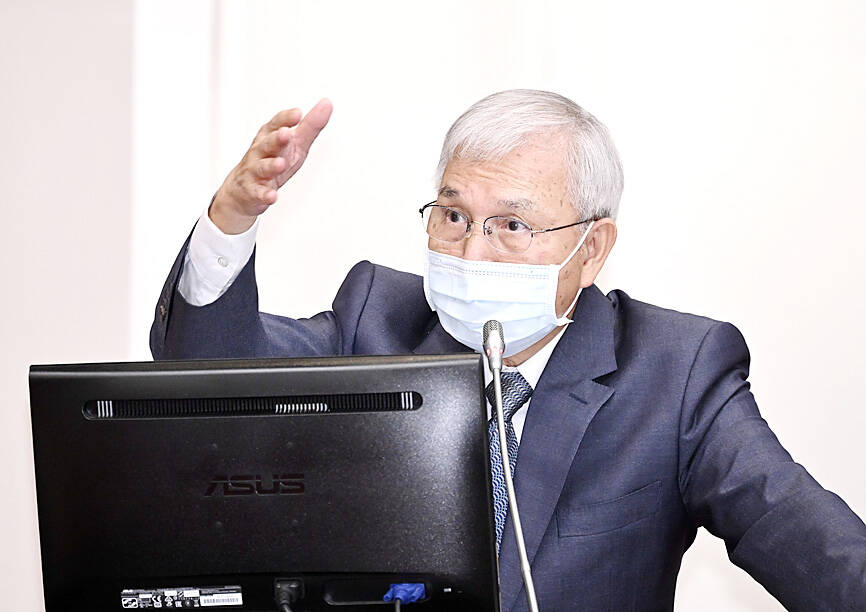Taiwan’s tight monetary cycle is not yet over and consumer price movements would dominate the central bank’s policy decisions, central bank Governor Yang Chin-long (楊金龍) said yesterday.
Yang made the remarks while taking questions from lawmakers at a meeting of the legislature’s Finance Committee, which is reviewing the central bank’s proposed budget for next year.
“The central bank did not rule out the possibility of raising interest rates in the future after leaving interest rates unchanged for the second time in September,” Yang said.

Photo: Peter Lo, Taipei Times
The flexibility in policy stance is appropriate, as inflationary pressures linger and consumer prices have not yet returned to the 2 percent target, he said.
The consumer price index (CPI) last month accelerated above the 3 percent mark as successive typhoons disrupted fruit and vegetable supply and drove up their prices, the Directorate-General of Budget, Accounting and Statistics reported on Tuesday, calling the uptick seasonal and transient.
Yang refused to define his stance as either “dovish” or “hawkish.” Rather, the governor said he is approaching the matter in a “data-dependent” fashion like the US Federal Reserve.
The Fed on Wednesday last week decided to hold its benchmark lending rate at its current 22-year high for the second consecutive policymaking meeting.
Taiwan’s central bank detailed its reasoning and considerations in the minutes of the September board meeting, Yang said.
In the document released last week, all board directors supported a policy pause to avoid straining the economy, but some raised the need to revive rate hikes if rents, housing prices and public expectations warrant tightening.
Taiwan’s export-reliant economy would come out of the woods and resume steady growth from this quarter, giving the central bank room to focus on its mandate to stabilize consumer prices, several directors said.
The US, the EU and the UK all share the need to turn the CPI back to the 2 percent target so that inflation would not wipe out the benefits of economic growth for average people, Yang said.
The policy goal might not be achievable until 2025, as major central banks seek to dodge a hard landing and services inflation tends to be sticky, the governor said.
Taiwan’s inflation is relatively moderate at an estimated below 2.5 percent this year and would lose further steam next year, Yang said.
The central bank is looking to generate NT$200 billion (US$6.2 billion) to the state coffers next year, in line with cautious management of the nation’s foreign exchange reserves, the governor said.
The approach enabled the monetary policymaker to stay profitable last year, despite a bearish market worldwide, he said.

UNCERTAINTY: Innolux activated a stringent supply chain management mechanism, as it did during the COVID-19 pandemic, to ensure optimal inventory levels for customers Flat-panel display makers AUO Corp (友達) and Innolux Corp (群創) yesterday said that about 12 to 20 percent of their display business is at risk of potential US tariffs and that they would relocate production or shipment destinations to mitigate the levies’ effects. US tariffs would have a direct impact of US$200 million on AUO’s revenue, company chairman Paul Peng (彭雙浪) told reporters on the sidelines of the Touch Taiwan trade show in Taipei yesterday. That would make up about 12 percent of the company’s overall revenue. To cope with the tariff uncertainty, AUO plans to allocate its production to manufacturing facilities in

Taiwan will prioritize the development of silicon photonics by taking advantage of its strength in the semiconductor industry to build another shield to protect the local economy, National Development Council (NDC) Minister Paul Liu (劉鏡清) said yesterday. Speaking at a meeting of the legislature’s Economics Committee, Liu said Taiwan already has the artificial intelligence (AI) industry as a shield, after the semiconductor industry, to safeguard the country, and is looking at new unique fields to build more economic shields. While Taiwan will further strengthen its existing shields, over the longer term, the country is determined to focus on such potential segments as

TAKING STOCK: A Taiwanese cookware firm in Vietnam urged customers to assess inventory or place orders early so shipments can reach the US while tariffs are paused Taiwanese businesses in Vietnam are exploring alternatives after the White House imposed a 46 percent import duty on Vietnamese goods, following US President Donald Trump’s announcement of “reciprocal” tariffs on the US’ trading partners. Lo Shih-liang (羅世良), chairman of Brico Industry Co (裕茂工業), a Taiwanese company that manufactures cast iron cookware and stove components in Vietnam, said that more than 40 percent of his business was tied to the US market, describing the constant US policy shifts as an emotional roller coaster. “I work during the day and stay up all night watching the news. I’ve been following US news until 3am

COLLABORATION: Given Taiwan’s key position in global supply chains, the US firm is discussing strategies with local partners and clients to deal with global uncertainties Advanced Micro Devices Inc (AMD) yesterday said it is meeting with local ecosystem partners, including Taiwan Semiconductor Manufacturing Co (TSMC, 台積電), to discuss strategies, including long-term manufacturing, to navigate uncertainties such as US tariffs, as Taiwan occupies an important position in global supply chains. AMD chief executive officer Lisa Su (蘇姿丰) told reporters that Taiwan is an important part of the chip designer’s ecosystem and she is discussing with partners and customers in Taiwan to forge strong collaborations on different areas during this critical period. AMD has just become the first artificial-intelligence (AI) server chip customer of TSMC to utilize its advanced